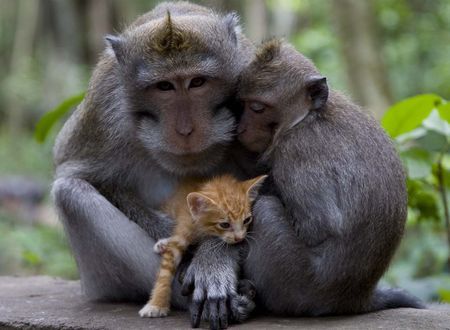Sastang Dandavat at your lotus feet Swamiji.
Before starting on the meaning of ‘Gratitude’ let me tell you a story of our great Mulla Nasruddin. One day Mulla ji lost his donkey which he used regularly and the same was an indispensable part of his life. But he was not sad, rather he appeared quite charming on the contrary. When a friend of him came and asked, “ Mulla, you have lost your donkey, but still you are happy? Have you lost your mind in the trauma?” Mulla ji smiled and replied, “My dear friend, I am really grateful to God. Just imagine, if I had been riding on the donkey, I would not even be present hear to reply to your query. Thank God, I am not lost!”
The reply may seem funny (and of course it is), but it has much deeper meaning. Mulla was thankful to the almighty for the event whereas most of us would scream,” Oh! God, why did it happen to me? God, how could you be so cruel on me? Blah, blah…”. This, my friend, makes the difference. This is the truest form of gratitude.
As per Oxford dictionary ‘Gratitude’ can be defined as
gratitude
/ˈɡratɪtjuːd/
noun
the quality of being thankful; readiness to show appreciation for and to return kindness.
Yes, the quality of being thankful has been demonstrated by Mulla in the above example. This is a dictionary explanation. As ‘Gratitude’ is a human emotion, let us discuss what various researchers have defined through their systematic studies in more detailed manner.
As per Harvard Medical School gratitude is:
“A thankful appreciation for what an individual receives, whether tangible or intangible. With gratitude, people acknowledge the goodness in their lives … As a result, gratitude also helps people connect to something larger than themselves as individuals–whether to other people, nature, or a higher power”
The above statement carries a lot of depth in meaning. It clearly tells that one can be grateful for what one has received whether positive or negative. Of course, labelling something ‘positive’ or ‘negative’ is quite relative and depends upon our perception, level of maturity, pragmatism and a lot of other factors. Positive and negative are just the two sides of a coin. For example, a Stock Market crash is a ‘negative event’ for the ‘Bulls’ whereas it is a ‘positive event’ for the ‘Bears’. But for a neutral observer, it is a single event which is interpreted in exactly opposing ways by the ‘Bulls’ and the ‘bears’. Under adverse conditions also one can be thankful that the damage suffered could have been lot worse. The effects were limited to such and such extent only which could have led to more damaging consequences.
If we analyze, the second part of the definition, we are amazed to see the result! It helps one to connect with something larger than themselves as individual. One can rise above the ‘I, me, myself feeling’ to tap into one’s higher being and experience connection between mother nature and the supreme power. It has the ability to release us from the shackles of our limited thought process. Isn’t it amazing, just think!
As per another team of researchers, gratitude is:
“the appreciation of what is valuable and meaningful to oneself and represents a general state of thankfulness and/or appreciation”
(Sansone & Sansone, 2010).
This signifies that the state of being thankful can transcend one beyond the physical boundaries to love universally and unconditionally.
Yet another powerful and deeper definition of ‘gratitude’ goes as
“gratitude has a dual meaning: a worldly one and a transcendent one. In its worldly sense, gratitude is a feeling that occurs in interpersonal exchanges when one person acknowledges receiving a valuable benefit from another. Gratitude is a cognitive-affective state that is typically associated with the perception that one has received a personal benefit that was not intentionally sought after, deserved, or earned but rather because of the good intentions of another person”
(Emmons & Stern, 2013).
Here, distinction between feeling and state is made. As a feeling it is the sense of being thankful. But the important one is ‘cognitive-affective’ state. Let me explain practically. I have read several member posts, posts of Sadhvi jis, Sushree jis. I have found several instances of reference “Swamiji, what you have done for us or doing continuously, do we really deserve all these? Are we worth receiving your ” Did I really deserve to be uplifted from my low mental state through Swamiji’s grace? What great Karma do I have? At least I am not aware of any such in this current birth. It is rather the good intention of Swamiji which put me back on the track.
Yes, I am getting a bit preachy with all such definitions, which is not in general my style of writing. Please excuse me. I think my real-life examples are simple to understand as I am relating to the ‘difficult definitions’. But a systematic study calls for a little pain. Please bear with me.
Let us now understand ‘gratitude’ in simpler form. It is basically a social emotion which puts forward our acknowledgement of the things that others have done for us (mostly not expecting anything in return). The straight forward example is what Swamiji is doing for all of us, the severe hard work – all selflessly, without an iota of any kind of expectation to be precise.
In summary, gratitude is a positive emotion felt after being the beneficiary of some sort of gift. It is also a social emotion often directed towards a person (the giver of a gift) or felt towards a higher power. Acknowledgment, appreciativeness, gratefulness and thankfulness are most relatable synonyms in our context.
On the other side of spectrum some people are not appreciative despite being the beneficiary of an altruistic act. Can you think of a time when you felt this? Most people can. It is not a pleasant experience for anyone.
A major downside of being ungrateful or thankless is that, it deprives us of the emotional rewards of gratitude, which is well established by clinical research studies. It is not a difficult task. Let us just add a ‘Thank you’ in our lives as the simplest form of practice of Gratitude.
Do acknowledge, if someone is doing something for you. Yes, you are paying the Municipality boy to collect garbage, but will you do the work if the boy tells you to pay the amount to yourself and do the job? We all know the answer. So, let’s be grateful.
Let me end the discussion with the following quote of famous Indian-American Author Deepak Chopra
“Gratitude opens the door to the power, the wisdom, the creativity of the universe. You open the door through gratitude.”
Jai Shri Hari…









Comments & Discussion
12 COMMENTS
Please login to read members' comments and participate in the discussion.